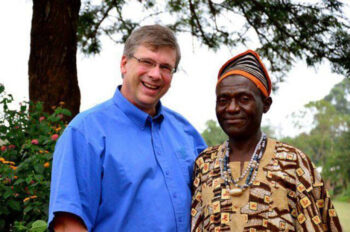By Mark Ellis —

A Wycliffe Bible translator in Cameroon was hacked to death with a machete in the early hours of Sunday August 25th during a terror attack on his village. His wife’s arm was cut off in the horrific encounter.
Bible translator Angus Fung was among seven people killed during an attack by Fulani Muslim herdsmen sometime during the early hours of Sunday morning in the town of Wum, Efi Tembon told the Christian Post (CP).
Tembon serves with the Christian ministry, Oasis Network for Community Transformation.
After Fung’s wife, Eveline, had her arm cut off, she received a blood transfusion at a local hospital.
Fung was in his 60s and served for years with Wycliffe Bible Translators. He and his wife completed a New Testament translation in the Aghem language in 2016.
“He was one of the key community leaders in the whole tribe and he was part of the translation services and also coordinated literacy efforts,” Tembon told CP. “So, he was a huge part of the literacy work because their language had never been written before. So, he was the one coordinating it and teaching the language. So many people now can read and write the language as a result of Angus’ work.”
The Fulani population is mostly nomadic or semi-nomadic and live throughout West Africa. Due to population growth and desertification, Fulani herdsmen, almost exclusively Muslim, have migrated south towards more fertile lands to graze their herds. This created conflict with local farmers, mostly Christian. The resulting violence has caused over 10,000 deaths.
The attacks committed by Fulani extremists are often motivated by ethnic and religious cleansing and Christian churches and communities have frequently been a target of the terrorism.
Wum is in an area fighting for independence from the government. Tembon believes young people among the Fulani herdsmen have been encouraged by the government to carry out attacks against farmers that support separatist rebels.
Five homes were attacked early Sunday morning. “They went into houses and pulled out the people,” Tembon told CP. “They attacked in the night and nobody was expecting. They just went into the home, pulled them out and slaughtered them.”
Although the New Testament translation for the Aghem language was completed and over 3,000 copies have been published, Tembon said that distribution has been hampered by the conflict in the region.
“This war is a complete disruption of what has been going on,” Tembon told CP. “We haven’t been able to dedicate it because of the war. We are doing what we call listening groups. We have done the recording and started listening groups where people come and listen to scriptures together in the community.”
According to Tembon, Wum is a rural town of no more than 5,000 people. About 90 percent of the town’s people consider themselves to be Christian but also practice traditional religions. While the local people live and farm in the town, Muslim Fulani herders live and graze their cattle on a hill outside the town.
But because the area is controlled by separatists, he claimed the government has encouraged and even armed Fulani to carry out attacks against the separatist-supporting communities as a way of pushing a “religious twist” to the conflict.
“The government knows that the local people are supporting the local forces,” he told CP. “The Fulani are Muslim and they are a minority in the area. And they always have a farmer-grazer problem between the local people and the Fulani. The government uses that now to get the Fulani on their side as an ally to fight the local people. So they have been armed and protected by the government and terrorize the local people.”
Tembon noted that not all Fulanis are a party to such attacks, adding that some Fulani have even joined the separatist rebels and some Fulani live in the town with the rest of the local community.
Tembon said that Sunday’s attack is not the first to have happened in Wum. In June, villagers in Wum were reportedly attacked and several homes were burned down, including the palace of the local chief.
“They have burned churches and have killed people in several areas,” he said. “The local people have killed their cows as revenge.”



